Government/Policy

April 15, 2018
Steel User Testifies: Tariffs are a Tax on U.S. Manufacturers
Written by Tim Triplett
“The tariffs are already causing our jobs and work to shift to competitors outside our borders and will continue to do so until action is taken. What was presented as a tariff on foreign steel producers has effectively become a tax on U.S. manufacturers like us,” stated Kevin Kennedy, president of Kennedy Fabricating, Inc., Splendora, Texas, in testimony before the House Ways and Means Committee on Thursday. Following is an edited transcript of Kennedy’s testimony in opposition to Section 232:
“The structural steel industry in the U.S. employs over 200,000 people in 2,300 businesses of which 1,700 are fabricators like us. These companies are the very essence of American small business… We fabricate steel for a wide array of end uses that make up the country’s infrastructure: drilling rigs, cell towers, commercial buildings, pipelines and industrial plants. In this decade alone, we have grown revenue over 40x. We are proof that American manufacturers can still compete in a world of cheap foreign labor….
“We exist today primarily because of our ability to adapt to and overcome the many challenges that private businesses face…. Today, however, we are presented with an insurmountable obstacle that no U.S. manufacturer should have to face. We face the challenge of our own government effectively subsidizing foreign manufacturers at our expense by giving them a significant cost advantage through the Section 232 steel tariffs.
“These tariffs have eliminated imported steel overnight, and without any competition U.S. steel producers have raised prices over 40 percent. Why should we pay 40 percent more here than our foreign competitors pay in their countries? This means that a company in China can now purchase a raw steel beam from a Chinese mill at a 40 percent discount, drill two holes in it, and ship it to the U.S. as a fabricated good without a tariff. This is a major loophole, and it needs to be addressed….
“And it’s not just China. One of our Canadian competitors just went from a position of losing projects to us, to now winning projects at our expense, because they can import raw steel from Canada without a tariff and purchase it 40 percent cheaper than we can from our own domestic suppliers. They can then build their structures and ship them to our U.S. customers having never paid a tariff. This specific example has already cost us millions of dollars in work—work we needed to maintain our business and employees. So, who wins?
“Before today, we were an exporter. We were competitive enough to manufacture drilling rigs and export them to countries like India, Russia, and even Mexico. Not so today. We went from exporting our products to international buyers, to having the U.S. government force our U.S. customers to import the products we make from our foreign competitors. Again, who wins?
“It’s been said that the tariffs are insignificant to ‘downstream’ prices. That may be debatable for some items like cars, planes and high-end equipment, but not for fabricated steel. The raw steel targeted with these tariffs makes up almost half the cost of many products in our industry, and our customers will not pay for such an increase. They’ve said as much, and our lack of new orders confirms it. This begs the question: Who wins?
“We don’t need our government to remove the obstacles that our business encounters. We have a 30-year track record proving our ability to adapt and overcome those. We do, however, need our government to stop creating obstacles through practices that serve to aide our foreign competition at the expense of U.S. jobs.
“We understand that these tariffs are an attempt to protect U.S. steel producers from unfair competition. But who will be here to buy the U.S. steel they produce if our government forces our customers to go abroad for their fabricated goods? Remember, we’ve always adapted. For 30 years we’ve adapted. But, the transfer of our jobs and customers across our borders at the directive of our government is the one obstacle to which we cannot adapt.
“So, who wins? Not U.S. manufacturers and not U.S. workers. We both lose. Is our national security interest truly served by having the ability to produce raw steel but no manufacturers to actually buy it? It is time to reconsider the Section 232 tariffs. In their current form they do more harm than good.”







